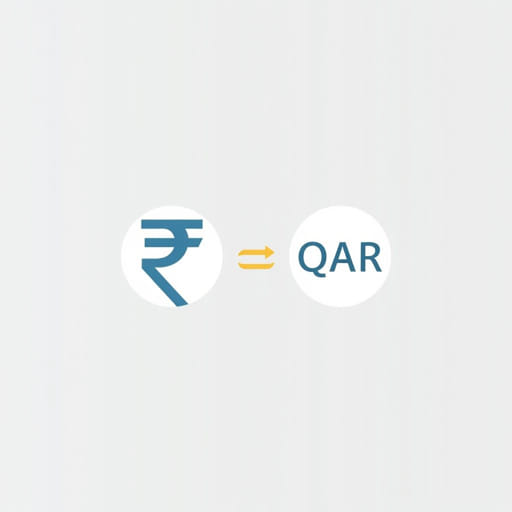Converting Indian Rupees (INR) to Qatari Riyals (QAR) is a common financial need, especially for travelers, migrant workers, business owners, and investors engaging in transactions between India and Qatar. Understanding the exchange rate dynamics, conversion methods, and the best practices for currency exchange can help individuals make the most of their money. Whether you are sending remittances, paying for imports, or preparing for a trip to Qatar, knowing how to manage INR to QAR conversion is essential.
What is INR and QAR?
Indian Rupee (INR)
The Indian Rupee is the official currency of India, issued and managed by the Reserve Bank of India (RBI). Represented by the symbol â¹ and the code INR, it is used in all domestic financial transactions across India.
Qatari Riyal (QAR)
The Qatari Riyal is the official currency of Qatar, issued by the Qatar Central Bank. It is denoted by the symbol ï·¼ and the currency code QAR. The Riyal is pegged to the US Dollar at a fixed rate, which adds a level of stability to its exchange value.
Factors Influencing INR to QAR Exchange Rate
The exchange rate between INR and QAR is not constant. It fluctuates due to various economic, political, and market-related factors. Here are some key factors that affect the INR to QAR rate:
- Interest Rates: Differences in interest rates between India and Qatar affect the flow of capital and currency value.
- Inflation Rates: Higher inflation in India can reduce the value of the Rupee compared to the Riyal.
- Economic Stability: A stronger economy leads to a stronger currency. Qatar’s oil-driven economy adds strength to the Riyal.
- Trade Balance: If India imports more from Qatar than it exports, this can increase demand for QAR, affecting the rate.
- Global Currency Trends: Movements in USD, to which QAR is pegged, can indirectly influence INR-QAR rates.
Methods to Convert INR to QAR
Currency Exchange at Banks
Most commercial banks in India and Qatar offer currency conversion services. You can visit a bank branch to convert your Indian Rupees to Qatari Riyals. Banks usually charge a margin over the interbank rate and may also include service fees.
Authorized Money Changers
Licensed money changers and forex service providers are popular options for converting INR to QAR, especially in airports, malls, and major urban centers. These providers may offer better rates than banks and process transactions faster.
Online Currency Exchange Platforms
Several online platforms now allow you to convert INR to QAR from the comfort of your home. These services offer real-time exchange rates and allow payments through bank transfers or digital wallets.
International Transfer Services
If you need to send money from India to someone in Qatar, you can use international money transfer services. Some popular options include:
- Western Union
- MoneyGram
- Wise (formerly TransferWise)
- Remitly
These platforms allow you to transfer INR, which gets converted to QAR and deposited into the recipient’s account or made available for cash pickup.
How to Check INR to QAR Exchange Rates
To get the best value, you should check the latest exchange rates before converting your money. Some tools and sources for checking rates include:
- Currency conversion websites like XE or OANDA
- Mobile banking apps with forex services
- Google search for real-time conversion
- Forex news and financial newspapers
Steps to Convert INR to QAR
Here’s a basic step-by-step guide to converting Indian Rupees to Qatari Riyals:
- Determine the amount of INR you want to convert.
- Check the current INR to QAR rate using an online converter or bank portal.
- Compare rates from different service providers (banks, forex agents, online platforms).
- Select a provider with favorable rates and low fees.
- Complete the required KYC documentation (passport, ID proof, etc.).
- Proceed with the transaction and collect the equivalent amount in Qatari Riyals.
Tips for Getting the Best INR to QAR Rates
Currency exchange can cost you more than you think if you’re not careful. Follow these tips to maximize your value:
- Avoid Airport Exchanges: Exchange counters at airports often have unfavorable rates and high service fees.
- Plan Ahead: Monitor exchange rates ahead of your transaction to buy QAR when the rate is favorable.
- Use Digital Platforms: Online currency exchanges often provide better rates due to lower overhead costs.
- Know the Total Cost: Be aware of hidden charges, including transfer fees, service taxes, or conversion margins.
- Keep Documents Ready: For large conversions, ensure all identity and compliance documents are available.
Exchange Rate Example
Suppose the current exchange rate is 1 INR = 0.045 QAR. If you wish to convert â¹20,000, the calculation would be:
â¹20,000 Ã 0.045 = 900 QAR
The final amount may vary depending on the fees and rate spread applied by the service provider.
Legal and Compliance Requirements
In India, foreign exchange transactions are governed by the Foreign Exchange Management Act (FEMA). Individuals must comply with RBI regulations and provide proper documentation when converting or transferring money abroad. Always choose a licensed provider to ensure compliance with local laws in both India and Qatar.
Who Needs INR to QAR Conversion?
There are several groups of people who regularly need to convert INR to QAR:
- Migrant Workers: Many Indians working in Qatar send remittances to their families or convert INR to QAR upon arrival.
- Students: Those studying in Qatar may need to transfer funds from India to cover tuition and living expenses.
- Travelers: Tourists visiting Qatar must exchange INR to QAR for day-to-day expenses.
- Businesses: Indian companies importing goods from Qatar need to make payments in QAR.
Converting INR to QAR involves understanding the exchange rate, knowing the available conversion methods, and choosing the best platform for the transaction. Whether you’re traveling, studying, working, or doing business, being informed helps you save money and avoid unnecessary fees. Monitor real-time exchange rates, compare providers, and always comply with financial regulations to ensure a smooth and cost-effective currency exchange process.
